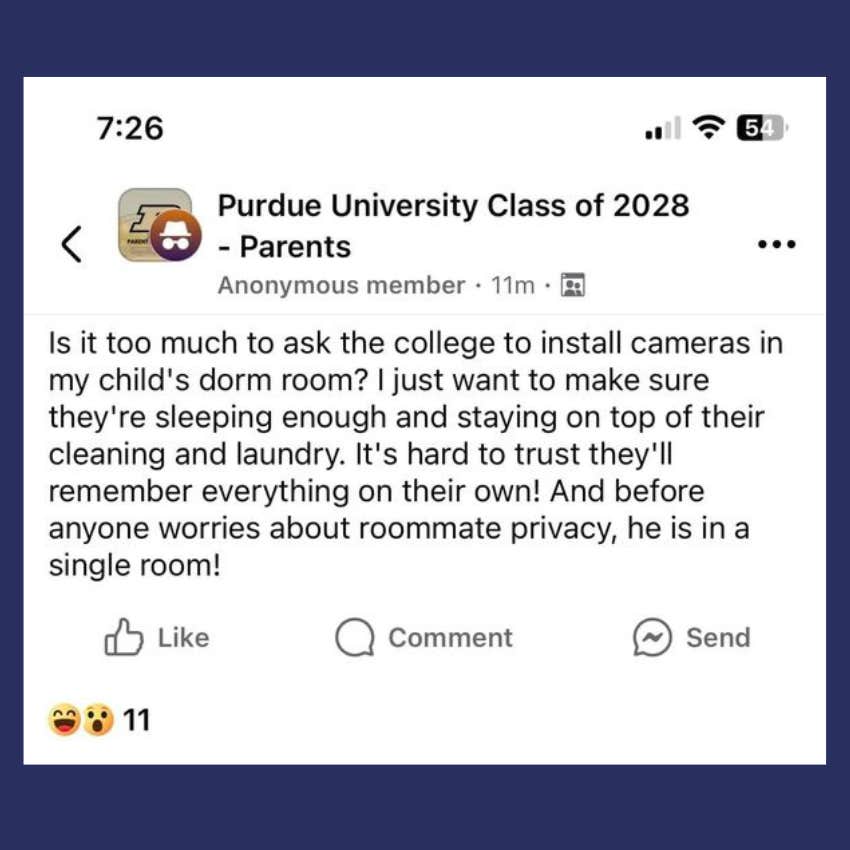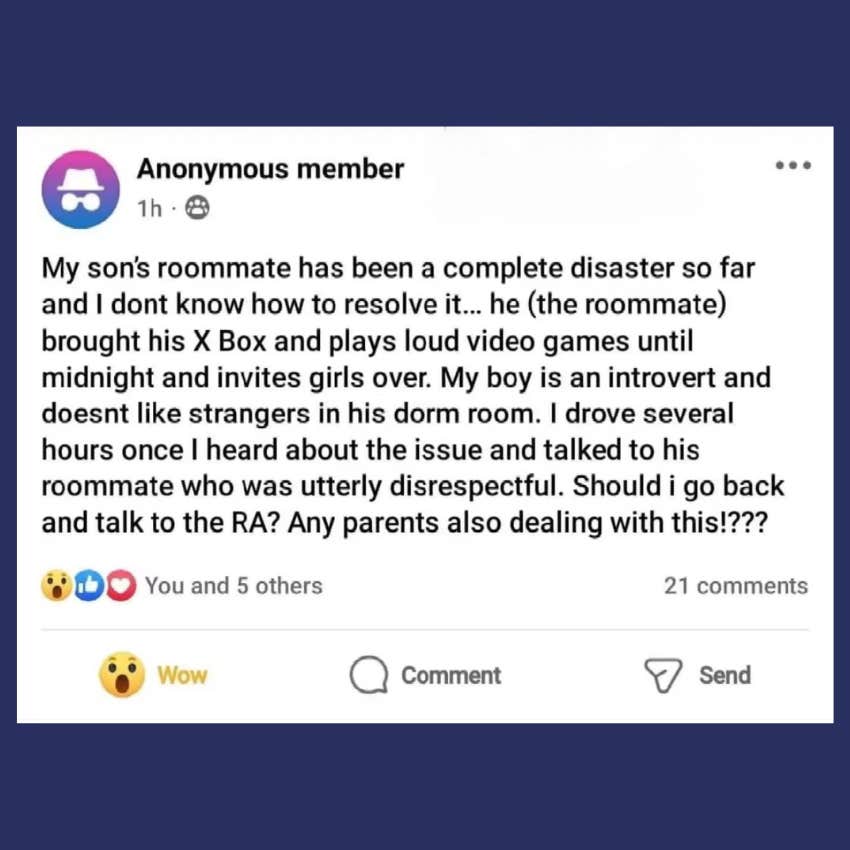Mom Wants To Install A Camera In Her Freshman Son’s College Dorm To Make Sure He’s Sleeping Enough
You have got to let your kids go and figure out how to navigate problems on their own. That's half of what college is for!
 Monkey Business Images | Shutterstock
Monkey Business Images | Shutterstock For years now, we've heard so much about Gen X and millennial "helicopter parents" and the supposedly inept Gen Z and Gen Alpha kids they're raising that it's all become a full-on stereotype.
But with a new class of young Gen Zs freshly off to college, there's some indication that these stereotypes might have a kernel of truth to them.
People on social media are slack-jawed at a helicopter mom of a Gen Z freshman who wants to install a camera in her son's dorm room.
Going off to college is a huge adjustment for kids and parents alike. Kids, of course, are on their own for the first time, and parents are having to navigate truly letting go of their children in a way that is often unprecedented.
But viral screenshots from college parents' forums on Facebook indicate that a lot of these parents are simply refusing to even consider letting go — so much so that they're inserting themselves into their kids' college affairs in shocking ways.
Case in point: a mom who wants to install a camera in her son's dorm room to make sure he's sleeping enough. A screenshot of her post, allegedly made in a Purdue University Facebook group, found its way to X and has left people shocked.
 X
X
In the post, the mom indignantly wrote, "Is it too much to ask the college to install cameras in my child's dorm room?" Yes, ma'am, it is! The fact that you're even asking this question is patently insane!
Parents of college-age kids today are still young enough to remember the "sock on the doorknob" code from their own college days. What on Earth is this mom thinking?
Well, frankly, she's OVERthinking. "I just want to make sure they're sleeping enough and staying on top of their cleaning and laundry," she went on to say. "It's hard to trust they'll remember everything on their own! And before anyone worries about roommate privacy, he is in a single room!" Oh okay, that makes it totally normal and fine I guess!
Obviously, this is an extreme example of overreach and many online questioned whether it was even real, assuming it was just clickbait to get people riled up. (Either way, it worked.)
But many others with experience working on campuses pushed back to say they don't find it even remotely implausible.
And given some of the other posts from similar forums that people have shared showing moms treating basic rites of passage like crises that require intervention, it's really not all that unbelievable.
One forum is full of moms panicking about — and even inserting themselves into — their kids' college roommate disputes.
Some of the posts are just normal parents worrying and venting about their concerns about their kids. Which is understandable. Adjusting to dorm life IS hard. I spent basically my entire first semester of college in the dorm lobby phone booth (because I'm ancient) crying on the phone to my mom about how much I hated my roommate and sharing my space. I'm an anxious introvert. It was a nightmare. And my mom worried too.
But that was where it stopped — at worrying. She'd give me some sympathy and then tell me, "You're going to have to figure it out." She'd urge me to talk to my RA or the other counseling staff on-site and find a way to push through until Thanksgiving. What else was she supposed to do?
In many of today's moms' eyes, the answer to that question seems to be "handle it myself." Some moms expressed outrage at the supposed ineptitude of their sons' RAs (and it's notable that ALL of them are "boy moms"), posting Karen-like takedowns of the RAs' failures to make their sons' college lives frictionless — which is not really the job of RAs, who are just college kids themselves.
But other mom's fully took things into their own hands. "My son's roommate has been a complete disaster so far and I don't know how to resolve it," she wrote in outrage over her son's roommate's habits of playing video games until midnight and having girls over.
 @W_B_Rick / X
@W_B_Rick / X
But instead of helping her son navigate it for himself, she just hauled off and did it for him. "I drove several hours once I heard about the issue and talked to his roommate, who was utterly disrespectful," she wrote. Oh wow, I'm so shocked that his roommate wasn't amenable to this utterly unhinged overreach!
She then asked if she should DRIVE BACK to talk to the RA instead. No, ma'am, you should back off and tell your son he needs to handle it himself because he is an adult now. Are you going to hold his hand through every job interview he has too? (Honestly, probably, given that this is an actual trend employers and recruiters are saying they're seeing.)
Even many parents were appalled by the posts and urged parents to back off and let their kids learn on their own.
"If you are a parent," writer Jane Coaston wrote on X in reference to these unhinged posts, "and at any time you are tempted to contact your child's RA at college, resist that temptation with every single fiber of your being."
She then added, "I am trying and failing to remember if my parents had any concept of any RA I ever had," a sentiment that many others on X shared.
"My parents dropped me off and then asked me how things were going the next time we spoke at Thanksgiving," journalist Tom Fornelli added.
To many parents today that probably sounds harsh, but the question I'd ask them is: How do you expect your kids to learn to be independent, autonomous adults if you do not ever afford them the opportunity to learn by doing?
I hope you remember from your own coming-of-age that adulthood comes with no handbooks, and even what your mom and dad teach you in your formative years only goes so far. More importantly, data shows that this constant hovering is significantly damaging and impairing young people.
There is evidence that parental overreach is wreaking havoc on Gen Z's mental health and ability to navigate adulthood.
You know that horrifying Gen Z mental health crisis we're constantly hearing about? One survey found that a staggering 42% of Gen Zs were diagnosed with a mental illness, for example. What do you suppose is causing this?
The causes are surely myriad, but science has found that overprotective "helicopter parenting" is likely one of them. A 2022 study, for example, found a direct correlation between helicopter parents and anxiety and depression in their children.
Correlation is not causation, of course. But given the way "helicopter parenting" has repeatedly been shown to saddle kids with issues like self-doubt — one of the hallmarks of anxiety — this correlation is worth being taken seriously. There's even evidence that overprotective parenting hinders kids' development of executive function in their brains.
It's surely difficult, especially for Gen X parents, who grew up in a totally different world and were given parental latitude that often bordered on neglect, to not swing the pendulum as far as possible in the other direction.
But hovering over your child's every move and inserting yourself into their every challenge robs them of their own empowerment, and the anxiety that produces can be crippling.
I'm just one guy, but I'll tell you this — the only thing that got me through my horrible freshman first semester was my mom finally putting her foot down in October and refusing to come get me on the weekends until Thanksgiving.
By then, I didn't even WANT to go home — I was too busy enjoying the life I was creating. And I can't help but wonder if that is ultimately the fear these kinds of parents are really grappling with — the fear of no longer being needed, the transition of their parental role into a more adult framework.
I don't have kids, but I can imagine how heart-wrenching that is. But the hard truth is that avoiding that heartache by denying your child the opportunity to learn from their own trials and tribulations ultimately tasks your child with managing your emotions and insecurities for you. That's not only unproductive, but it's also unfair, unkind and potentially ruinous.
Let them go. It won't be without its foibles and trip-ups, and it may not even come without a lot of tears. But they'll be okay in the end. They have to learn to stand on their own two feet — and they need you to be the one that lets them do it.
John Sundholm is a news and entertainment writer who covers pop culture, social justice and human interest topics.

